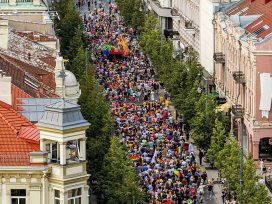 Almantas Samalavicius: Few would, I hope, disagree that your book Inventing Europe: Idea, Identity, Reality, published in 1995, made a significant, timely and fresh theoretical contribution to the European discourse in the social and political sciences and humanities – not only because, prior to its publication, discussion about Europe were somewhat one-dimensional and shallow, but also because the enlargement of Europe created new controversies, doubts and contradictions in both “old” and “new” European countries. The Lithuanian translation appeared in 2002 and since then it has been frequently quoted and referred to in academic discussions on a wide range of issues about the past, present and the future of Europe – which, as we all know, has become rather vague and somewhat confused. Could you specify the most urgent problems the European community is facing today, seventeen years after the book’s publication? Do you feel that you need to reconsider or develop any of its claims beyond the original scope of your concerns?
Almantas Samalavicius: Few would, I hope, disagree that your book Inventing Europe: Idea, Identity, Reality, published in 1995, made a significant, timely and fresh theoretical contribution to the European discourse in the social and political sciences and humanities – not only because, prior to its publication, discussion about Europe were somewhat one-dimensional and shallow, but also because the enlargement of Europe created new controversies, doubts and contradictions in both “old” and “new” European countries. The Lithuanian translation appeared in 2002 and since then it has been frequently quoted and referred to in academic discussions on a wide range of issues about the past, present and the future of Europe – which, as we all know, has become rather vague and somewhat confused. Could you specify the most urgent problems the European community is facing today, seventeen years after the book’s publication? Do you feel that you need to reconsider or develop any of its claims beyond the original scope of your concerns?
Gerard Delanty: Despite its success, the book has some shortcomings; indeed, these shortcomings are probably the reason for its success. The basic argument of the book was stated in too polemical terms. The notion that European identity had always been forged in terms of a relation of hostility to an Other needs to be reassessed and a more nuanced argument put forward. The book was too influenced by Said’s critique of orientalism, by constructivist theories of collective identity, and by a Foucauldian notion of discourse. The result was a far too negative critique of the European heritage and an interpretation of the “rise of the West” that has been discredited by historical sociology. Since the mid-1990s there has been a huge amount of literature on the questions the book was addressing and this all needs to be taken into account in any assessment of the idea of Europe. This includes sophisticated theoretical work on European integration, but it also includes new work in historical sociology and social theory as well as political philosophy. In addition, the developments of the past fifteen years need to be taken into account, especially the consequences of the enlargement of the European Union and the wider global context.
My work since 1995 has led me to question – and in part reject – the polemical thesis of the book. In numerous papers and another book, Rethinking Europe: Social Theory and the Implications of Europeanization (2005, co-authored with Chris Rumford), as well as an edited volume Europe and Asia Beyond East and West (2006), I have developed new perspectives, such as the idea of a “post-western Europe”. I have moved away from simple constructivist views of identity, heritage, and so on as a power-centred construction based on self/other relations, to a position that gives greater recognition to cosmopolitan and hermeneutical relations. I am currently writing a new version of the book, entitled Reinventing Europe: A New Critical History.
AS: Today, many parts of Europe, like other parts of the world, are seeing a great influx of migrants, people who are changing places for economics reasons, because of employment opportunities, or because of political, religious or ethnic persecution. One of the theses of Inventing Europe was that citizenship based on participation and solidarity is the single most significant element in constructing the future of Europe. You also suggested that the notion of post-national citizenship is a more important ideal than any form of European unity. Would you still argue this today and if so, what are the prospects of implementing it?
GD: The notion of post-national citizenship refers to a citizenship that is not restricted by nationality. It does not mean anything more than that; and indeed, many national approaches to citizenship are now, in part, post-national. It is thus still highly relevant to the current situation in Europe and in almost every part of the world where large numbers of migrants are forcing the political community to be defined in more inclusive terms. So the question is not whether it is needed but how far it should be taken. The EU’s notion of European Citizenship is post-national only in a very limited sense, since it is derivative of national citizenship.
AS: You stressed that post-national citizenship is a true alternative to a narrow understanding of citizenship, conditioned as it is by where the individual lives instead of his or her original nationality. You even went so far as to suggest that the ties between citizenship and nationality are to be broken. However, this claim was modified by the emergence of a more hostile climate to “strangers” in numerous European countries. A critic might question whether “post-national citizenship” is more likely to be a long-term political project an not something attained in the next few decades. What would be your reply to such a criticism?
GD: That it is factually wrong. Almost every country nowadays recognizes that persons other than nationals have rights, such as human rights; in the countries of the EU, these rights have now been incorporated into national law. The result is a pluralization of nationality. Such developments should be seen not in zero-sum terms, as either present or absent, but as a matter of degrees. Countries are to varying degrees post-national. It is of course the case that there is much resistance to the separation of citizenship from nationality. From a more normative philosophical perspective, one should recall that citizenship is a condition that is not constrained by nationality as such. It is a status based on rights, and rights take many forms. Indeed, one may be a national but experience a loss of rights. It is the case that nationals of one country have more rights of citizenship than nationals of others.
AS: A decade or two ago, discussions regarding the prospects of eastern and central European countries becoming members of the European Union and developing a culture of liberal democracy were based on the assumption that the construction of “civil society” would end the controversies caused by totalitarianism and the rise nationalism that followed its fall. These days, however, more and more authors are likely to suggest that notions such as “civil society” are mere abstractions rather than the guidelines for realistic policy. Shouldn’t one give up such “amoeba-like” constructs and look for new and more promising intellectual tools? Personally, I feel that some notions simply don’t work or, if they do, only in the realm of theory. Where should one draw the boundary between pure social theory and political praxis in issues such as, say, “civil society”?
GD: I agree that it is pointless making highly normative claims that have no empirical reference points. However I don’t agree that the notion of civil society is of no relevance. The concept is indeed often used to refer only to progressive political movements, when in fact the notion of civil society includes within it all kinds of non-state actors, including religious and nationalist movements. In any case, whatever it includes, it is a highly relevant concept in referring to the political domain that lies outside the state. As for central and eastern Europe becoming democratized, I think it is self-evidently the case that they have, even if this has been mixed up with neo-liberalism and neo-nationalism. As with citizenship, democracy is always a matter of degree.
AS: Countries of eastern Europe (Lithuania among them) have come a long way since the demise of communism and over the last two decades have experienced a great deal of social “turbulence” that has brought disillusionment about both rightwing and leftwing political parties, which have proved to be equally morally corrupt. These experiences seem to have given way to a social climate propitious for the formation of strange and controversial populist political forces. The phenomenon of thriving populism is also related to failures in social and economic reform. How might these tendencies affect the development of Europe in the future?
GD: The current political and economic crisis – post September 2001 and post September 2008 – occurred during a period when the EU had embarked on both enhanced integration and enlargement, which was placing additional strain on its regulatory capacity. It is now apparent that a single currency without a sovereign state to back it up produces outcomes that undermine the very possibility of integration in any meaningful sense. Within the eurozone, the member states have lost the power to devalue their currency, leading to an unsustainable situation of economic and political bankruptcy. Given the absence of an EU-level public budget, it is hardly surprising that Europeans are increasingly looking to other sources of solidarity. The new politics are anti-systemic and have a lot to do with the crisis that has been brought about by capitalism since 2008. In central and eastern Europe, the attraction of economic deregulation and privatization has proven to be irresistible for the ex-communist elites; there the loss of a social conception of society appears to be more costly than in the West, where the tradition of social democracy remains strong.
AS: In Inventing Europe you note that, after the fall of Soviet communism, the identity of western Europe can no longer be constructed according to the rules of the Cold War. One external threat – previously associated with communism – was replaced by another: the spectre of Islam. This observation now seems to be supported by much more evidence than it was possible to provide in, say, 1995. How, in your opinion, are changing relations with Islam redrawing the concept of Europe and European culture since 9/11?
GD: I think the spectre of Islam becoming the new enemy has been much exaggerated. Of course, developments within political Islam have been important in changing perceptions, but I do not think there is much evidence to justify the claim that there is something like a clash of civilizations occurring. The relation between Europe and Islam cannot be easily summed up as a single or continuous one. Islam is part of Europe’s civilizational heritage and, as a result of migration in recent decades, a European Islam now exists that can be viewed as the latest expression of a long history of European-Islamic links.
AS: In some parts of Europe, the idea of Europe is still strongly associated with Christianity, despite the fact that Christianity does not feature in the official discourse of the European Union – though, as we know, the late Pope John Paul II made conscious attempts to persuade European establishment of the importance of preserving this part of Europe’s cultural and spiritual heritage. One can hardly deny that, at least historically, Christianity is its most essential part. So why are policy-makers today so negative about embracing Christianity, at least as something that has culturally affected and formed certain aspects of Europeanness? Is there a fear of cultural or ideological hegemony? Some would perhaps be inclined to ask whether, by sustaining such fears, we aren’t rejecting an important part of Europe’s spiritual legacy.
GD: Europe is not a unified hegemon, despite the efforts of the EU, but highly pluralized religiously and, despite the presence of state churches in some countries, relatively secular. Christianity itself has been a source of division as much as unity. Given the diverse forms of Christianity that developed in the western and eastern parts of the Roman Empire, the legacy of the Reformation, the Counter-Reformation and modern secularism, the Christian legacy is by no means clearly defined. Much of modern Europe was shaped in a process of secularization in which Church and State were gradually separated. The conflicts of the early modern period over the confessional identities of the European states established long-lasting tensions and much of modernity emerged in opposition and renunciation of the Christian heritage. To state that Europe is defined by Christianity is too straightforward, since the internal divisions within Christianity have been the source of many of the divisions within Europe. Yet there is no denying the tremendous impact of Christianity in the shaping of Europe. The debate about the inclusion of a special recognition of Christianity in the preamble to the proposed European Constitution is a good example of this: as is well known, the conclusion was that the European heritage is not specifically defined by Christianity. Christianity shaped European history but did so in way that undermined the possibility of cultural unity.
AS: In the book you discussed issues of European geopolitics, noting differences between south and north in some European countries, or divisions between east and west in Europe as a whole. How relevant are these differences are today? Do they still play a part in shaping Europe’s future?
GD: They are still relevant. I have argued for a notion of a “post-western Europe” as a characterization of Europe today, a Europe divided along different geopolitical lines and shaped by different routes to modernity. The notion of Europe is not underpinned by a fixed spatial or temporal reference point, but is continuously constructed in discourses about it.
AS: After enlargement, Europe’s eastern part symbolically “moved” from the periphery to what, using Wallerstein’s term, can be called Europe’s “semi-periphery”. How has the ascent of eastern Europe influenced the self-image of contemporary Europe, which for decades was somewhat ignorant of its eastern areas? Despite the numerous controversies and problems cropping up one after the other in the post-communist realm, how are these countries affecting the general vision of Europe?
GD: That is exactly what I mean by the notion of a “post-western Europe” – a conception of Europe not entirely fixed and shaped by the founding western core states, nor one defined exclusively in terms of the historical heritage of western Europe. Any account of the European heritage will today have include the historical experience of those parts of Europe that were shaped by the Ottoman and the Russian empires. This will entail a shift to the margins and a view of Europe that gives more centrality to its relation with those parts of the world that lie at its borders, which of course have constantly shifted throughout history.

 Almantas Samalavicius: Few would, I hope, disagree that your book Inventing Europe: Idea, Identity, Reality, published in 1995, made a significant, timely and fresh theoretical contribution to the European discourse in the social and political sciences and humanities – not only because, prior to its publication, discussion about Europe were somewhat one-dimensional and shallow, but also because the enlargement of Europe created new controversies, doubts and contradictions in both “old” and “new” European countries. The Lithuanian translation appeared in 2002 and since then it has been frequently quoted and referred to in academic discussions on a wide range of issues about the past, present and the future of Europe – which, as we all know, has become rather vague and somewhat confused. Could you specify the most urgent problems the European community is facing today, seventeen years after the book’s publication? Do you feel that you need to reconsider or develop any of its claims beyond the original scope of your concerns?
Almantas Samalavicius: Few would, I hope, disagree that your book Inventing Europe: Idea, Identity, Reality, published in 1995, made a significant, timely and fresh theoretical contribution to the European discourse in the social and political sciences and humanities – not only because, prior to its publication, discussion about Europe were somewhat one-dimensional and shallow, but also because the enlargement of Europe created new controversies, doubts and contradictions in both “old” and “new” European countries. The Lithuanian translation appeared in 2002 and since then it has been frequently quoted and referred to in academic discussions on a wide range of issues about the past, present and the future of Europe – which, as we all know, has become rather vague and somewhat confused. Could you specify the most urgent problems the European community is facing today, seventeen years after the book’s publication? Do you feel that you need to reconsider or develop any of its claims beyond the original scope of your concerns?




